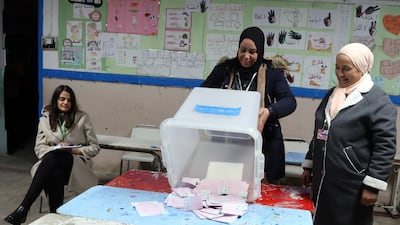Over the past 12 months, Tunisians have had reasons to celebrate. Tennis star Ons Jabeur – dubbed the “Minister of Happiness” by fans – reached number two in the sport’s world rankings, and the country’s footballers beat former colonial power France in the World Cup.
In the realm of the economy and politics, however, the mood could hardly be more different.
Tunisia’s 7-million-strong electorate was encouraged to elect candidates to fill 131 seats in the country’s House of Representatives. Instead, most of them opted to stay away from the polling stations. A nation that enthusiastically embraced the idea of multiparty democracy in a mass uprising in 2011 recorded a voter turnout of just 11.3 per cent.
The first round of the parliamentary election, held in December, recorded a near-identical turnout – 11.2 per cent. Even neighbouring Algeria, among the world’s bottom 10 in terms of voter participation, recorded a higher turnout in its 2021 parliamentary election, at 23 per cent.
This collapse in voter participation is all the more worrying given that Farouk Bouasker, head of Tunisia’s Independent High Election Authority, said the contest had gone smoothly with no serious breaches of the rules, suggesting voters were deterred by a more generalised disillusionment, rather than expectations of corruption or fraud.
Although this pointed snub to the ballot box is relatively new (turnout at previous elections since 2011 has been at least 40 per cent), the wider problems haunting Tunisia are not.
The economic challenges that fuelled the initial demand for political change in 2011 remain despite years of elected governments promising to deliver better standards of living and more opportunities for the Tunisian people. The country is seeking $4 billion from the IMF to shore up its finances. Unemployment is high –16 per cent in the first quarter of last year – and inflation is more than 10 per cent, something that has led to shortages of basic food items and essential medicines.
What Tunisians really want is no mystery: work, decent salaries, fair government and an end to corruption. The fact that they currently see little value in voting, even for opposition parties, shows how unlikely they think it is that anyone in the political class is offering a clear route to achieving these basic needs. There is also an obvious risk that the sense of malaise, moreover, could empower extremist parties keen to capitalise on public discontent. Indeed, this is what happened in the aftermath of the 2011 uprising, resulting in the downward spiral of political fracturing that has brought the country to where it is today.
Far too many bright young Tunisians are also voting with their feet, escaping to Europe, a continent plagued by its own economic woes but that still seems to offer an upgrade to what Tunisians are offered at home.
The dream of a better Tunisia is not dead, of course. The preponderance of uncast ballots is in itself an expression of public opinion that something has to change. If Tunisia’s leaders wish to govern with popular support, they must take steps to develop confidence not only in the political system, but in other parts of the state. That means engagement with civic society, the trade unions, young people and all parties that have Tunisia’s best interests at heart.
Until that happens, the sight of Tunisians marching away from, not to, the ballot box could continue.


